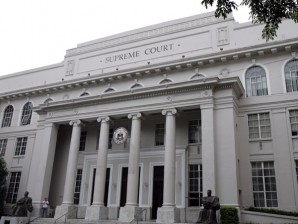High Court asked to stop implementation of 3 provisions of Cybercrime Prevention Act
MANILA, Philippines—A businessman is asking the Supreme Court to stop the government from implementing three provisions of Republic Act 10175, or the Cybercrime Prevention Act of 2012, which was enacted by President Aquino on Sept. 12.
In a 28-page petition filed on Monday, Louis “Barok” Biraogo told the high court that the three provisions cast a “chilling effect’’ on the rights of individuals.
Biraogo specifically asked the tribunal to issue a temporary restraining order on the implementation of Section 4 [c], Section 12 and Section 20 of the cybercrime law as well as its penal provisions for violating the 1987 Constitution.
“With the enactment of Republic Act No. 10175, cyber technology, once a boom to petitioner and the general public, is now subjected to subtle but pervasive State monitoring and control,” Biraogo said in his petition.
Sec. 4 (c) [4] of the said law criminalizes libel, not only on the Internet, but also on “any other similar means which may be devised in the future.” Biraogo said this practically enables the law to cover all technologies in communication and cyber space. He pointed out that current legislations must only deal with “realities of the present and should refrain from speculating about the future.”
Sec. 12 authorizes law enforcement authorities to “collect or record by technical or electronic means” communications transmitted through a computer system.
Biraogo said this provision is dangerous because it gives law enforcement authorities the authority to “eavesdrop, monitor and record the communication and correspondence of any citizen” without court order.
Birago also said the provision is inconsistent with Republic Act 4200, or the Anti-Wiretapping Act.
Sec. 20, meantime, authorizes the criminal prosecution of persons who do not comply with “any order of the NBI and PNP issued pursuant to Sec. 12 “with imprisonment of prision correctional in its maximum period or a fine of One hundred thousand pesos (Php100,000) or both, for each and every noncompliance.” Biraogo argued that this disqualifies anybody convicted of the crime from applying for parole.
Biraogo, who was upheld by the high court in a petition assailing the constitutionality of the Aquino administration’s Truth Commission, said Congress and President Benigno Aquino III committed grave abuse of discretion in enacting the law.
“The enactment of this statute is attended with grave abuse of discretion because its questioned provisions contravene Sections 3 (1) (on inviolability of privacy of communication) and 4 (on freedom of speech, of expression, of the press, and peaceful assembly), Art. III (Bill of Rights) of the 1987 Constitution,” the petition read.
“Prior to the enactment of Republic Act. No. 10175, petitioner had no reason to feel intimidated from using his personal computer systems in his business correspondence and in his personal communications. After all, the State had no legal authority to eavesdrop on, monitor or record any of his communication and correspondence without a lawful court order allowing the same.”
“Likewise, petitioner had no reason to feel intimidated from using his computer system because he was well aware of the recognized legal limitations obtaining in the use of cyber technology, and that he was operating within its bounds,” the petition read.
